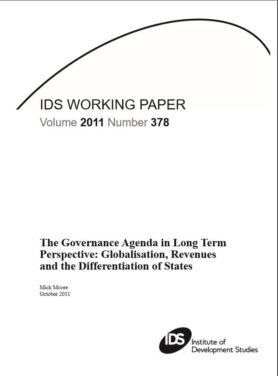IDS Working Paper 378
The governance-and-development agenda that has dominated thinking since the collapse of the Soviet Bloc is fast losing credibility. It continues to be associated with a set of countries, ideas and experiences – the ‘West’ – that no longer enjoy global leadership. It has not usefully identified the role of governments in promoting economic growth. And it takes little account of the ways in which states are changing. The growing influence of the BRICs and other emerging powers is now widely appreciated.
This paper explores the ways in which late twentieth century globalisation is bringing about more subtle changes in the political constitutions of states that may have considerable implications for the ways in which we are governed and the actions that may be needed to reduce the incidence of bad governance. Contrary to widespread expectations, globalisation does not necessarily lead states to become more like one another, or to converge around the ‘Western’ model of liberal democracy and market capitalism. It also leads states to compete with one another. To the extent that they compete by seeking alternative sources of revenue, this may lead them to diverge politically.
The concept of political revenues – the incomes that governments and political elites obtain through the exercise of political power – is central to the analysis. One of the consequences of late twentieth century globalisation is that, in some countries, opportunities for political elites to gather (illicit) elite political revenues have expanded considerably. This helps explain why fragile states have become a normal feature of the global system. A more widespread consequence is that states enjoy a range of new non-tax revenues in addition to ‘normal’ tax revenues. This has significant implications for the accountability of governments to citizens.

